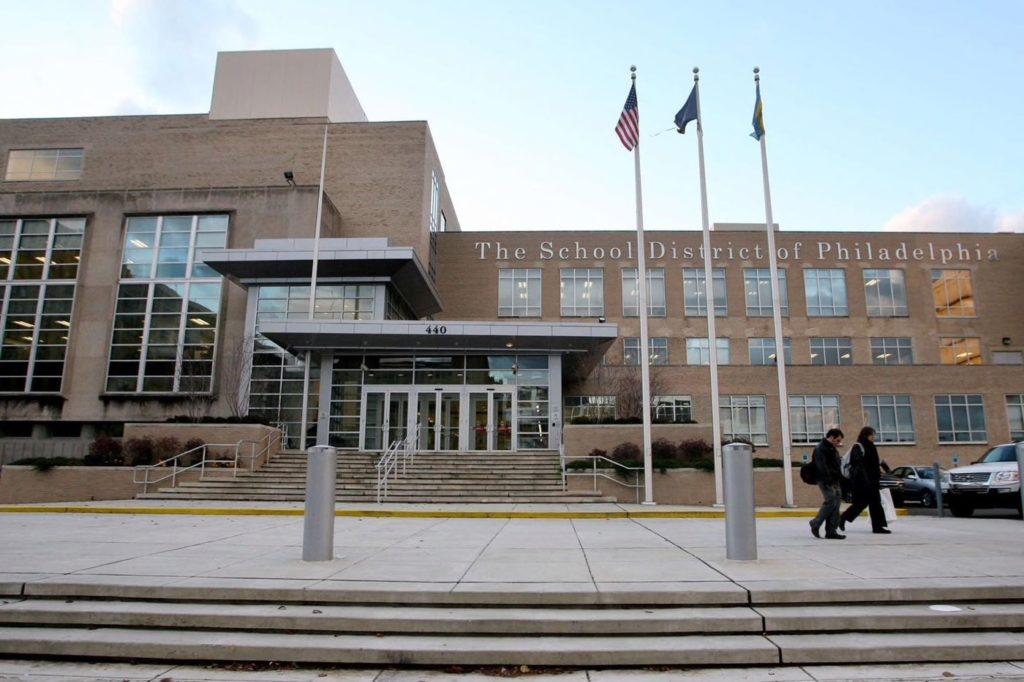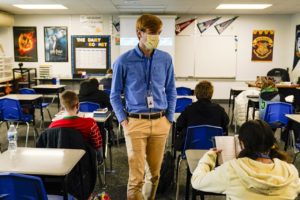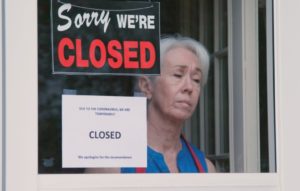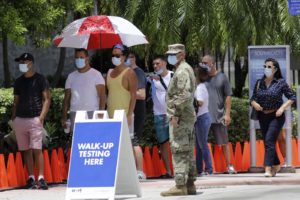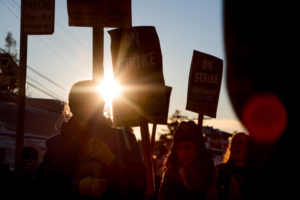Left Voice spoke with Marina, a high school teacher in Philadelphia for the past 11 years. This interview has been edited for length and clarity.
LV: When did coronavirus first hit your area? How bad was it, and how did people in your school district/immediate area respond?
Marina: Yeah, so our schools shut down Friday in mid March. It was like this slowly unrolling train wreck. They first announced that schools were going to stay open, but the schools surrounding Philadelphia had closed. So then they didn’t realize that the people who lived in surrounding areas weren’t supposed to travel. On Thursday, they announced that schools were going to be open, and then they realized on Friday that they weren’t going to have enough teachers, because so many teachers were supposed to quarantine in place in the surrounding counties that they lived in. So then, they decided that some schools were going to be open on Friday and some schools were gonna be closed. All of this was depending on what percentage of teachers lived outside of Philadelphia in quarantining counties.
That last day of school, it felt like we were underwater. Half the kids were there, and we were all just like “What’s happening?” And then they decided to close schools indefinitely the following week. I think in general, initially, people definitely responded really strongly in Philadelphia, at least that I saw, about social distancing, about staying home. I think as the mask requirements unrolled, I started seeing more and more people wearing masks out and about.
[We had already started] distributing laptops to students that week, because we sort of thought we saw it coming and we were like “Just take a laptop home.” We were lucky to already have the resources to have Chromebooks in our school. We had already mostly set it up, so at least half of our kids already had Chromebooks, and we started delivering them in the next weeks. But Philadelphia is an urban district without a lot of money, so a lot of schools were not positioned to do that. And so in the interest of making sure that students who did not have internet or who had an IEP or needed additional support were not held behind relative to other students, the district temporarily banned instruction and grading. This had an unfortunate effect. The kids that we had initially engaged then found out their work didn’t matter. It wasn’t being graded, so why were they doing this? So those kids disengaged, and I understand why.
They also had a lot of home responsibilities they were dealing with. Or, a lot of them did. But that made it very difficult about a month or so later. When we were allowed to start doing instruction again and start counting it, it could only count toward grade improvement. This meant a lot of kids didn’t bother to engage, because it felt like their work wasn’t being valued. A lot of my students were at home taking care of siblings, and a lot of my students actually went out and started working as essential workers in grocery stores and pharmacies because there were jobs and they could get money. They didn’t individually feel high-risk. Which also made it challenging to keep engaging them in school, because they had competing and totally understandable priorities.
LV: That last day of school, how were your students feeling? What were they saying?
Marina: They were scared. We had been talking about coronavirus in class just as like, what’s a pandemic? What’s a virus? How do things spread? Initially, it was just in China and maybe not that concerning, and then it moved very quickly. But that last day, they were scared. A lot of them, especially as they came in and saw that half the kids or more weren’t there, they started calling their parents and asking to go home ‘cause it feels anxiety-provoking. You’re like, this doesn’t feel normal, this doesn’t feel right. They used up a whole bottle of hand sanitizer, you know… sanitizing their hands every two seconds.
The other thing that is super frustrating is that so many of my students couldn’t access reliable internet. It seems unacceptable in a time when it clearly is a priority, that we couldn’t figure out how to provide free access. The Comcast in Philadelphia set it up so in theory, they offered a 60 day free internet package to low income families. But despite being Philadelphia’s primary internet servicer, they didn’t offer service in some parts of Philadelphia, so that wasn’t available to all of my students. It was mind-blowing, ‘cause these were kids who live in the city. It also wasn’t available to anybody who had fallen behind on their Comcast bills previously. At one point, the school district was like, “Why don’t you just go sit in school parking lots, where you can connect to the wifi from the schools?”
I think that, obviously, the epidemic has laid bare even more thoroughly all of the inequalities and access issues that exist in our society, and that’s been very clear in schools. A lot of my students were 15 and 16 years old, watching their younger siblings and helping their younger siblings with school, so they had less time to devote to school, IF they have wifi, IF their laptop didn’t break, you know….If, If, If.
LV: So, how are things looking for the fall for your district?
Marina: Supposedly, our school district is supposed to make an announcement tomorrow [July 15] about their tentative plan. 1[Between when this interview was conducted and when it was published, Philadelphia schools announced that they will be using a hybrid model of in-person and digital learning. Students and parents are also able to opt-in to an all-online Digital Academy.] There’s been strong indication that they’re leaning very strongly toward a hybrid model. Although again, I’m gonna be curious as to how that plays out, because the fact that Southern schools are opening up about 3 weeks before a lot of schools on the East Coast, I think that will be some kind of [indicator of what will happen]. I think at my individual school, we’ve been figuring out different hybrid schedules that could work. But again, the problem with a hybrid schedule is that you can’t both teach online and be in person at the same time. If you have smaller classes that meet in person, that takes up more time, which then just doesn’t leave teachers much time to teach virtually. You can’t suddenly make one teacher do three times the work in the same amount of hours. So it feels very unknown.
Our school district has had, in the past year, huge issues with asbestos in buildings. There are unsafe working conditions and unsafe learning conditions. I’m not convinced that those things have been addressed, on top of the fact that a lot of our buildings— my classroom doesn’t have windows! I don’t know how I’m supposed to go back and teach in person in a classroom that has an HVAC system that works 50% of the time and no windows and be safe. I think a lot of the conversation has revolved around, “Oh, well it seems like kids under 12 or kids under 14 don’t get it as badly or don’t transmit it,” but in none of those conversations am I seeing people really talk about high school students. Even in my school district, they’re focused much more on elementary school. Which feels like, if your focus is on opening elementary schools, make that explicitly your focus and commit to having high schools be online. I think that leadership in general is really afraid to stake the claim that they’re doing schools online. I think people are just kind of hedging their bets so if/when they decide to go fully online, they can be like, “Well we TRIED, and it just didn’t happen.”
I don’t think anybody outside of education understands the amount of work it takes to adjust to these different teaching models. You’re going to get a better quality of instruction if you pick one thing and just stick with it. I really feel pretty strongly that schools need to plan on opening remotely, because I think that takes the most time and amount of effort to set up, and then transition to hybrid if that becomes possible.
LV: In your dream world, what would the plan be?
Marina: That’s such a complicated question, because I think that teaching online is such a poor substitute for the kind of interaction and love, support, and care that our students need. But I don’t see any way that being in person is actually going to feel like what we want school to feel like. I think that when people envision people being back in school, they envision normal school, not people trying to stay 6 feet away and compulsively washing their hands. Being afraid every time somebody sneezes, and trying to teach through masks. I hate to say this, but I think my best version of this is that we stay remote. I think in an ideal world, we would put all our resources behind fully virtual school and really figuring out. How do we get food to students? How do we create safe spaces for students who can’t be home all day? How do we get students internet? We should throw all of our resources behind solving those problems instead of just assuming that students being in person is a cure-all for all of these social issues that we have shunted to school to be the place that we meet these needs.
LV: What are your biggest concerns right now, and what procedures are in place for if/when teachers start getting ill?
Marina: Through December 31st, I know that the federal leave stuff around COVID is still in effect. Our district hasn’t talked beyond that. I think that a real question for us is, what happens if somebody in my family tests positive? What happens if somebody in one of my students’ families tests positive? What happens if I have to quarantine but I’m feeling fine? I think all of those are big questions for us. As long as the federal coronavirus leave acts are in place, we have I think 2 weeks of quarantine or illness. But that’s on a federal level; that’s not something that the district is particularly doing.
I think my biggest concerns are, one, that people are gonna die. I think that if we come back in person, people are gonna die. Children are gonna get sick. Their grandparents that they live with are gonna get sick, teachers are gonna get sick, and people are gonna die because of these decisions. I think my other concerns are just how our students are going to do mentally and physically. Whether they’re virtual and they don’t get to come into school, or they’re coming into school, but it feels like a different space, and they’re being asked to wear a mask all the time, and everybody’s on edge. Irrespective of which decision gets made, I am worried about the mental, physical, and emotional impact this is going to have on young people, and on teachers, and on everyone, and on families.
Also, as a parent, I worry about if daycares close again. How will I be able to maintain a full teaching load while also providing childcare? I think in the spring, there was a little bit more of a sense of, “Oh, this is a temporary situation, people just make it work.” But now, I feel like people’s patience for parents juggling childcare and their jobs has worn thin, but the situation hasn’t changed.
I think the most terrible thing about this is the way teachers and parents are getting pitted against each other. As if their needs are diametrically opposed, when really as a society, if our biggest priority is opening schools, then we need to put our actions behind that and focus on making that feasible through money and through bringing down the number of positive cases in a county. Instead of prioritizing opening restaurants and bars and other things, bringing down the number of positive cases so that opening schools feels like a safer option. But it’s not really parents against teachers; it’s people who are concerned about young people and people who are concerned about capitalism.


